Editorial
The Real Stars of The Show: The Overlooked Value of Performers in the Nairobi Live Music Scene

Nairobi’s restaurant and cafe scene is flourishing, kila mahali all you hear is Hidden Gems this and that. Amidst this boom, there’s a common cultural thread tying many of these vibrant spots together: live music. As restaurants and cafes across Nairobi promote local artists you can’t help but ask is it the venues promoting the artists, or are the artists in fact the ones enhancing the venues?
While venues promote themselves as supporters of local talent, the reality showcases a more reciprocal relationship. Artists aren’t just background music because otherwise, they could just play prerecorded playlists; but would it really be the same? The unique ambience created by live performances transforms a regular dining experience into something special, becoming a primary reason customers choose one cafe over another. Despite this, at the end of the night, these artists might walk away with as little as 5,000 KES—a sum that hardly equates to the value they provide.
The Artist IS the Attraction
Artists bring a unique vibe to a venue, creating an ambience that can’t be replicated by a Spotify playlist or radio. Whether it’s the soulful strumming of a guitar or the soft notes of a jazz saxophone, live music adds a layer of authenticity and enjoyment to the dining experience that draws crowds. Regular patrons often turn into loyal customers, coming back not just for the food and drinks, but for the music that originally pulled them in.
The draw of live music is undeniable as more local artists emerge in Nairobi Live Music scene. On nights with scheduled performances, foot traffic in these establishments can spike significantly. This isn’t just about increased numbers; the diversity of the clientele also expands. Music lovers, friends of performers, and even passersby lured by the sound filtering through the doors help expand the usual customer base.
Beyond the immediate business that live music brings, there’s a further broader cultural contribution that these artists offer. They help define the character of a bistro or cafe, distinguishing it from competitors. Venues known for supporting local artists often gain a reputation as cultural centres, enhancing their brand and embedding them more deeply into the community fabric.
In discussing the dynamic between artists and venues during a recent interview with VibeYetu, JT Bulinda, an artist in the local music scene, shared his insights: “The assumption generally is that venues are doing a favour to the artists by letting them play, and while there is some truth in recognizing the platform they provide, that’s barely all there is to it.” His statement highlights a crucial point: the relationship is mutually beneficial. Venues gain a competitive edge and increase patronage through the distinctive cultural experience offered by artists, while artists receive exposure and a platform to showcase their talent.
Despite their significant contributions, our artists often face challenges. The compensation, if offered, can be minimal, and the acknowledgement of their role in attracting customers can be underappreciated. There is a growing conversation among the artist community about the need for fair treatment and better recognition of their contributions to the hospitality industry. At the end of the day as an artist, you need to earn however little you can and even more importantly, you have to keep singing and playing the instrument; so they end up being taken advantage of.


As Nairobi’s culinary scene continues to grow, recognizing the mutual benefits of this relationship could lead to more sustainable support for local artists and richer, more engaging experiences for patrons. In the thriving heartbeat of Nairobi’s eateries, perhaps the artists are the real promoters after all, deserving of fair compensation and recognition for the cultural vibrancy they bring to the table.
Let’s talk about it:
Editorial
Is Your Vote Really That Important?
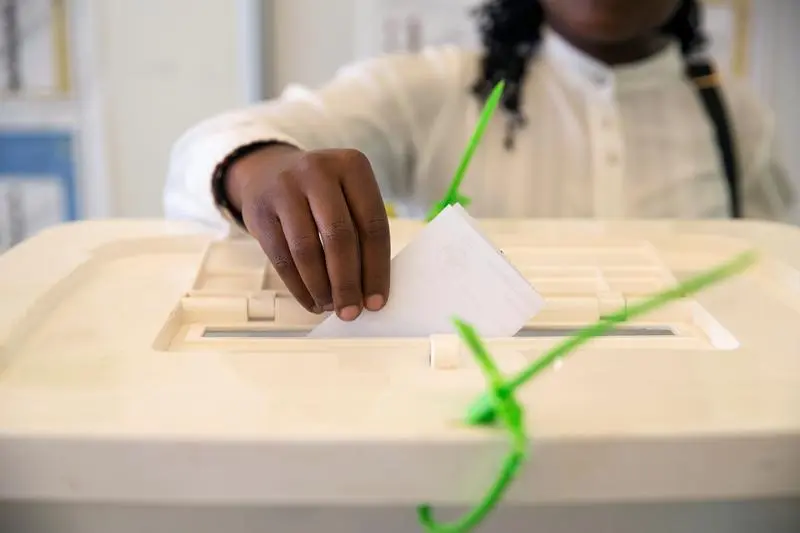

With everything going on in the country, there’s no better time to regret not having voted than right now. But don’t worry, mko wengi. But the question back then and perhaps right now is; Is your vote really that important? or maybe you had other reasons for not having voted?
Fair enough, maybe you were less than 18 years old, in which case, your time will come, be ready. Or maybe, you were in prison. In Kenya, prisoners can vote only in the presidential election, so perhaps that limited your participation. Or maybe, you were just too busy. But that still leaves a whopping number of eligible voters who chose not to vote. According to the Independent Electoral and Boundaries Commission (IEBC), out of 22,120,458 registered voters, only 14,466,779 turned up to vote. That means about 35% of registered voters didn’t participate. And that registered voters. Did you register to vote?
The media often call it “voter apathy,” but that term implies that non-voters are lazy people who would rather stay in bed than go to the polling station to queue in the scorching sun for an hour. The truth is more complex. A lot of people are informed, passionate, and knowledgeable, but have chosen, for their own reasons, not to participate. What legitimate, well-thought-out reasons could they possibly have? Share your reasons for not voting in the comment below.
Does One Vote Really Matter?
It’s fun to fantasize and imagine that your one vote could tip the balance and change the result of a general election. Realistically, of course, that never happens. Much more likely, you live in a constituency where it’s pretty obvious who’s going to win. Kenya has a ‘succession’ process for picking future politicians, and it can feel like it’s pointless because which tribe you come from and who endorses you matters. This is especially true if you prefer one of the smaller parties.
But here’s the thing: even if you can’t change who your MP is going to be, you can change their behaviour. How? The way parties behave in government is influenced by more than just the election results. It’s down to the election details. The morning after the General Election, all the stats of how many voters voted for whom and where are there for all to see, and party leaders are watching very carefully.
Every vote for a small party is a vote taken away from one of the big ones, and the big ones will do everything they can to try to win you back. Don’t believe me? Just look at some recent shifts in policy. When minor parties gain support, major parties often adjust their policies to win those votes back. So, every vote sends a message, even if it doesn’t elect your preferred candidate. Remember how much influence peak Opposition under Raila Odinga had on policymaking and the general direction of decision-making?
What If Everyone Thought the Same?
Could it be that you’re not voting because you think your vote doesn’t matter? Well, it seems really obvious, but what if everyone thought the same as you? Let’s say everyone in your constituency thought their MP was really safe and there was no need to vote, I mean we know they WILL win this right? It’s happened before in many places around the world. A supposed “safe seat” can be lost if too many supporters assume their vote isn’t needed. Your MP, no matter how popular, needs your vote to ensure they get the position.
There’s also a big difference between winning by miles and winning by a hair’s breadth. If your MP gets a thumping majority, they’ll be more confident about their convictions. On the other hand, if they just scrape in, they’ll be forced to compromise and pander to voters who never liked them in the first place. So you see? Succession politics is far from perfect, but there is no such thing as a wasted vote. That’s so important, I’ll say it again: there is no such thing as a wasted vote.
What If None of the Parties Speak to You?
For many people, after reading all the manifestos, watching all the party political broadcasts, and browsing all the party websites, they’ve decided that not a single one of the parties speaks to them. If this is you, rather than remove your voice completely, why not do something more productive and more fun? You can vote “None of the Above.”
In some countries, that’s actually a box you can tick, but in Kenya, you do this by spoiling your ballot. The rules of the ballot box are strict. You put an “X,” and nothing else, to make sure there’s no chance of error or fraud. If you put a tick, colour the box in, rank the candidates out of ten, or write something else, that’s called a “spoilt ballot,” and it won’t be valid. BUT IT WILL BE COUNTED.
Politicians will see the “None of the Above” votes, and they’re much more likely to try to win you over and much more likely to fix the system if you’ve bothered to go out and vote. Spoiling your ballot is an absolute worst-case scenario, a last resort, but it’s so much better than not voting at all.
It’s totally understandable why people think there’s no point in voting, but if you do go out and vote, there’s one thing that you’re absolutely guaranteed. When you and your friends are bitterly complaining that the country is being mishandled by a government you dislike, you can at least take solace in the ability to smugly shrug and say, “Well, it wasn’t our fault.”
So, is your vote really that important? Absolutely. Your vote matters more than you think, and your participation helps shape the future of Kenya. We are held accountable to governance by voting and who we give this power. Make sure your voice is heard, you affirm your citizenship and patriotism through involvement. This is how
Editorial
Honouring the Fallen and Charting a Path Forward
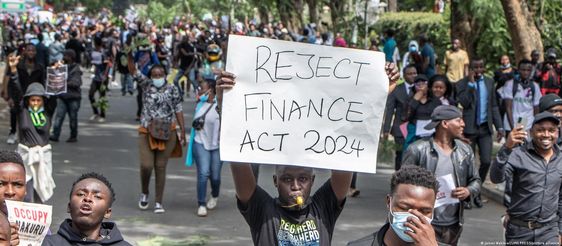

Recent protests across the country have left the nation grappling with tragedy and searching for a way forward. As we remember the 39 Kenyans who lost their lives during the #REJECTFINANCEBILL demonstrations, it’s crucial to understand the context of the unrest and carefully consider the next steps for the country inclusive of Gen Z.
The protests initially erupted over the rising cost of living and proposed tax hikes. Citizens, already struggling with economic hardships, took to the streets to voice their concerns about the government’s fiscal policies. A significant achievement of the demonstrations was the rejection of the controversial finance bill, which would have imposed additional financial burdens on Kenyans.
However, the cost of these protests has been high, with lives lost during clashes between demonstrators and the police. As we mourn these deaths, it’s essential to reflect on how we can honour their memory and work towards a more stable and prosperous Kenya avoiding more loss while consequently remaining steadfast in our ambitions and a just system.
One way to pay tribute to those who died is by maintaining political awareness and engaging in informed discussions about policy-making. By staying educated on political issues and participating in civic discourse, we help shape the future of the country and ensure that our concerns are heard. So don’t stop tweeting about political policies, don’t stop Instagram-sharing awareness posters to keep vigilance of those in power. Continually have conversations around governance, be involved, and be aware.
Continued accountability of leaders is another crucial aspect of honouring the fallen. We must remain vigilant and hold our elected officials responsible for their actions and decisions. This includes demanding transparency, questioning policies, and advocating for the needs of the people.
Voter registration is a powerful tool for making voices heard. By encouraging more Kenyans especially us Gen Z to register and participate in elections, the country can ensure that its leadership truly represents the will of the people. This democratic process is essential for long-term stability and progress. The best way to be heard as a citizen, and the best way to express your patriotism is to vote. Be heard.
In the wake of these tragic events, President William Ruto has called for dialogue. This presents an opportunity for all stakeholders to come together and address the underlying issues that led to the unrest. Both parties have to be willing to sit and be heard. Open and honest communication between the government and its citizens is vital for healing wounds and finding common ground.
As Kenya moves forward, it’s important to remember that change often comes at a cost. The lives lost during these protests should not be in vain. Instead, they should serve as a catalyst for meaningful reform and a reminder of the power of collective action. By continuing to engage in civic duties, holding leaders accountable, and participating in the democratic process, we honour the memory of those who died while working towards a brighter future for their nation.
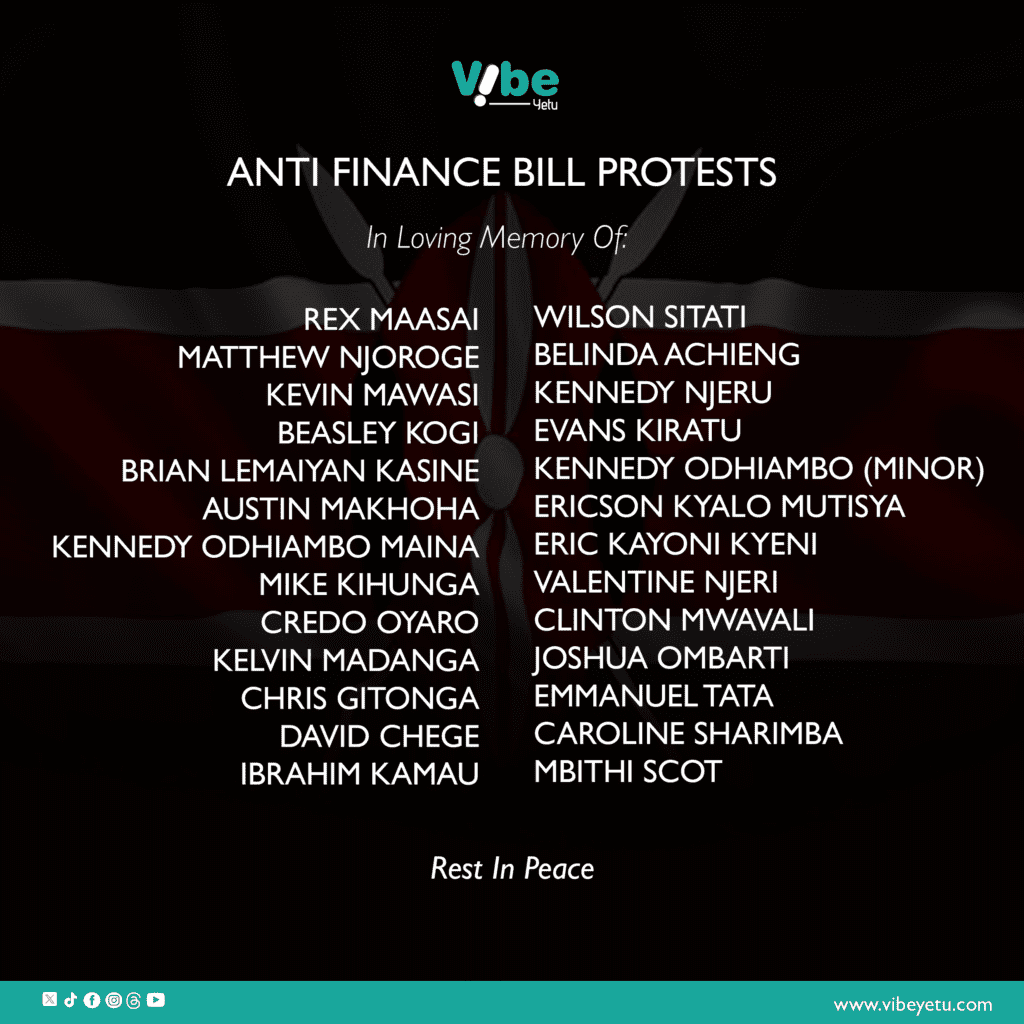

Editorial
How to Support and Contribute during The Flood Crisis in Kenya
In the wake of devastating floods across Kenya, communities are facing unprecedented challenges. As the cold exacerbates conditions and disease risks increase, your contributions, whether through donations of clothing to keep the vulnerable warm or financial support to aid rescue operations, can make a profound difference. Discover how even the smallest acts of kindness can provide substantial relief and foster hope in the hardest-hit areas.
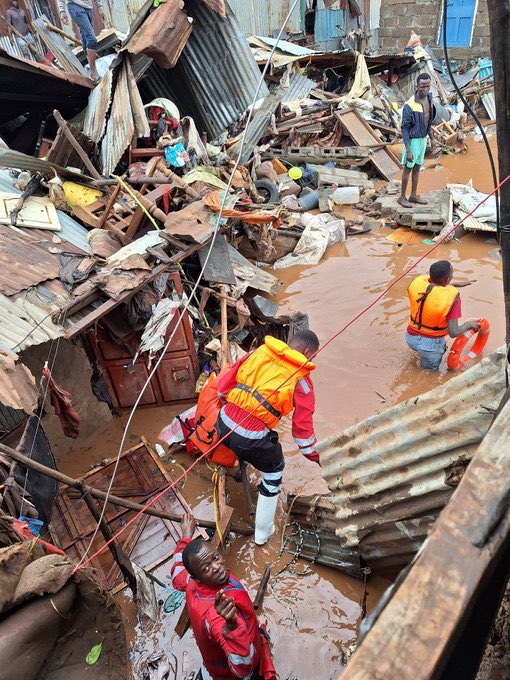

The recent catastrophic floods have taken a heavy toll, with thousands displaced and considerable fatalities. It’s hard to watch the news or log into social media and not be overwhelmed by the devastation. And nothing is worse than the helplessness that accompanies that devastation, I mean we are only human. However, there are ways we can make a difference, even from a distance and even in the littlest ways we can.
According to the Kenya Red Cross, as of 28th April, the floods have resulted in 69 deaths, 59 injuries, and 17 people missing. Out of Kenya’s 47 counties, 33 have been affected. Over 25,000 households have been impacted by the flooding, with 11,275 households displaced. Critical infrastructure has also suffered significantly, with 11 critical facilities, 9 health facilities flooded, and 35 schools destroyed. The economic impact is also severe, with more than 480 businesses affected and over 31,000 individuals from informal settlements displaced, with displacement camps set up in Busina, Kisumu, Homabay, Migori, and Kirinyaga.
The first step, however, even before extending help to others, it’s important to ensure your own safety first. Staying warm at all times, avoid high-risk roads and bridges that get flooded and keep informed about updates and warnings. Check your routes online before leaving for or from work, carry an umbrella, and do not let water stagnate. Check on family and friends and share safety tips, use social media to share warning messages and updates, helping to spread awareness and preparedness. As we worry about everyone else and do what we can to support and help them, it makes it easier to know that those around us; that our families and friends are staying safe. Text your parents and families to let them know that you are staying safe.
How to Support and Contribute during The Flood Crisis in Kenya
Donate Essentials
The floods exacerbate the vulnerabilities of already struggling communities with cases like Kibera and Mukuru cases, heightening risks such as disease outbreaks and exposure to harsh weather conditions. Many affected individuals are grappling with inadequate shelter, which makes them particularly susceptible to the cold. Donating your slightly used clothes and helping them stay warm through the rough nights goes a long way. Spreading warmth and love is the hope that they are not alone through these tough times.
Know a struggling family? Reach out to them and support them in the little ways you can, even if it’s just the essentials. Sanitary towels are at the top of that list; the cold weather influences a woman’s endocrine system, which controls the hormones responsible for regulating your period resulting in irregular or heavier flows.
Financial Support
Unfortunately, we cannot reach some of the people who need this help the most and we cannot do as much as we would individually like to help. But together, we can empower and support those that can; from non-governmental organizations to community-based organizations and even government rescue departments. Every donation counts, big or small. By contributing as little as 50 shillings or as much as 1,000, you directly empower organizations dedicated to aiding, supporting, and rescuing flood victims all over the country. These funds are crucial for sustaining their ongoing efforts and delivering vital services such as temporary shelters for the displaced, food, shelter, and medical aid to those in dire need.
Below are some I could find that you can send your support to:(Share more places for donation for us to keep updating this list on [email protected])
- SHOFCO (Shining Hope for Communities) is raising $100,000 to support communities affected by the floods.
- Kenya Red Cross
- https://www.mchanga.africa/fundraiser/97294
Volunteer
If you can spare the time, volunteering at your nearest disaster centre can make an insanely significant difference. Your skills and labour can assist in various aspects of disaster response and relief operations, supporting those on the front lines and those affected by the disaster. Even just being there for these people and offering support and compassion would go a long way in shining hope and love.
It’s important to remember that every little action counts, society is all of us together, a culmination of efforts towards a single cause. By understanding the situation and contributing in any way we can, we collectively make a significant impact. Let’s stand in solidarity with those affected and contribute to a hopeful, resilient future for all impacted by these tragic floods. As long as you are doing the little you can, we will as a community be alright. The anxiety you feel will be alleviated knowing you are doing something towards a better tomorrow. Remember to stay warm and safe.
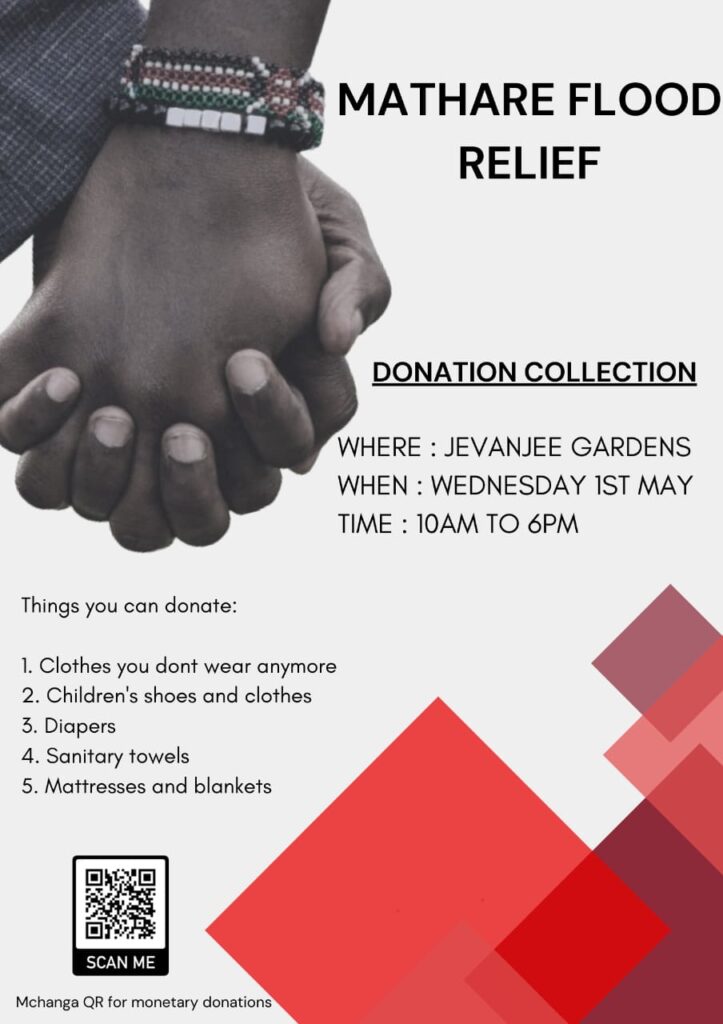



-



 A Chat With3 years ago
A Chat With3 years agoA MOMENT WITH SHARON WENDO, FOUNDER OF EPICA JEWELLERY
-



 Entertainment2 years ago
Entertainment2 years agoKenyan Movie Disconnect: The Wedding Planner Is Now Streaming On Netflix
-



 A Chat With2 years ago
A Chat With2 years agoFind out why ‘mutura is not a street food’ as Wanjira Puts it!
-

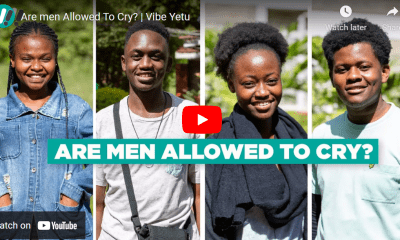

 A Chat With2 years ago
A Chat With2 years agoAre men allowed to cry?
-



 A Chat With2 years ago
A Chat With2 years agoThey Hooked Up With Their First Serious Boyfriends
-



 A Chat With2 years ago
A Chat With2 years agoA chat with one of the biggest female Djs right now, Dj Redbone
-



 A Chat With2 years ago
A Chat With2 years agoA chat with Atieno: A young radio personnel doing her thing behind the mics
-

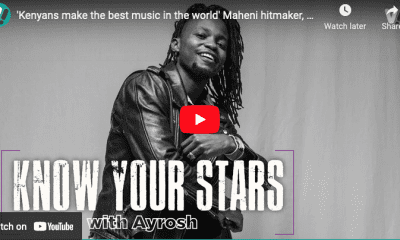

 A Chat With2 years ago
A Chat With2 years agoKenyans make the best music in the world, Ayrosh














